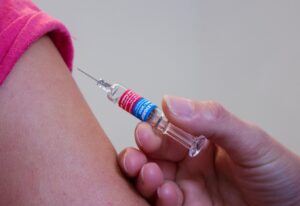Cancer Vaccination
As science and research progresses, hopefully we will be able to develop cancer vaccines that reduce the incidence of all types of cancers.
‘Vaccination’ for disease prevention has recently become a hotly debated topic on various media platforms despite scientific and medical evidence time and again showing their importance and effectiveness. The content written here is not a discussion about whether or not vaccinations are safe but to highlight the fact that we know that cervical cancer and hepatitis B induced liver cancer can be reduced through vaccination on a global scale. (Note: you can always read Dr P Offit’s Bad Advice and see these videos, The Side Effects of Vaccines – How Hight is the Risk? and What Deadly Diseases Look Like On Your Body‘ to appreciate the importance of vaccinations and how they have helped prevent serious illnesses worldwide).

According to the WHO
‘In 2012, cancer-causing infections were responsible for up to 25% of newly diagnosed cancer cases in low- and middle-income countries. Human papillomavirus (HPV) causes cervical cancer, and hepatitis B virus (HBV) causes liver cancer. Vaccination against these two viruses could prevent 1.1 million cancer cases each year.’
The HBV and HPV Vaccines – Two Cancer Vaccines So Far
Whilst the likelihood of someone being infected with hepatitis B (HBV) in the UK is significantly lower compared to in the developing countries, it is thought that around 180,000 people have chronic HBV. All babies born in the UK on or after 1 August 2017 are given a hepatitis B-containing vaccine as part of the 6-in-1 vaccine. For more information on the hepatitis B vaccine see here.
Similarly, the human papillomavirus (HPV) vaccine had been routinely offered to girls aged 12-13 years since 2008 but this has now been extended to boys from Sep 2019. For more information, the Vaccine Knowledge Project at the University of Oxford gives a good overview of the Key Facts concerning the HPV vaccine. The below video highlights the recent changes to the latest vaccination schedule for the HPV vaccine in the UK;
Courtesy of the NHS (taken from YouTube) Terms of Service
Hopefully, given the effectiveness of the HPV vaccine, this will directly correlate to a lower incidence of HPV-related cancers (i.e. cervical cancer and head & neck cancers) over time. For the latest figures from Public Health England please look at page 3-4 of Vaccine update: Jan 2020 where they report that HPV16 and HPV18 (that causes 99% of cervical cancer) infection rates have fallen below 2% in 16-18 year old women; 11 million doses of the vaccine have been given to young women in England with 83.9% coverage in Year 9 girls (see video by PHE). It will still be important, however, to take part in the cervical screening programme as described in the Cancer Screening section at the appropriate age and times.
Cancer Prevention Research >> Achieving Good Health & Resisting Cancer (n = 1) I Tackling Stress I Tackling Sleep I Tackling Obesity I Tackling Smoking I Tackling Alcohol I Tackling Poor Diet I Tackling the Lack of Exercise I Tackling Sun Exposure I Tackling the Work-Life Balance I Tackling the Fear of Seeing Your Doctor I Cancer Screening I Genetic Testing